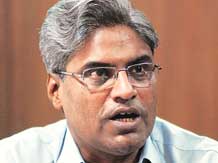 | « Back to article | Print this article |

The Employees Provident Fund Organisation will start investing in equities (exchange traded funds) for the first time this year, starting with Rs 5,000-6,000 crore (Rs 50-60 billion).
Central Provident Fund Commissioner K K Jalan (photographed below) talks to Business Standard on the development and its implications.
Edited excerpts:
When will EPFO start investing in equity?
We are going into the technicalities -- getting Internal approvals, certain changes in the EPF schemes, etc.
These should take place in the next 15-20 days and we should be ready to invest in equity in July itself.
What is EPFO’s incremental corpus and what proportion of the total corpus will go into equities?
EPFO’s investments this financial year should be Rs 1 lakh crore (Rs 1 trillion).
Of this, five per cent should be in equity. So it looks like Rs 5,000-6,000 crore (Rs 50-60 billion) into equity this year.
In the next five years, how much money could flow into equity markets?
If it turns out to be a positive experiment and we decide to invest 15 per cent in equities as per the guidelines and the investment corpus also rises, we might see Rs 30,000 crore (Rs 300 billion) a year flowing into stock markets.
The decision to invest in the equities market coincides with the Greek crisis. Do you think this would be the right time to invest in stock markets?
On the Greek crisis, maybe our portfolio managers will be able to give you a better idea. To my understanding, this might be a short-term problem and pension funds like ours always look at the long-term issue.
Also, we are not investing in any particular equity, but in exchange trade funds.
Over time, in the long-term, equity gives better returns.
How did you decide to invest in ETFs, in particular?
The logic is we don’t have the in-house capacity to decide on a particular stock.
Therefore, it is better to invest in stocks which are clearly defined, BSE 30 or NSE 50. That is how ETFs are created. We will try to invest in these funds.
 Apart from ETFs, will you be able to invest in direct stocks in the near future?
Apart from ETFs, will you be able to invest in direct stocks in the near future?
I don’t think it will be possible in some months.
Let us look at the present year and then we will see whether we want to increase our investment in equity or go into other equity funds, the kind of funds we want to adopt for investment, etc.
Will all fund managers handle EPFO’s investment in equity?
At present, we have five portfolio managers, but all of them have been selected on the basis of their experience in debt instruments, not equity.
Initially, we will go to the Central Board of Trustees and our finance committee to decide on the ETF manufacturer.
Most probably, State Bank of India will help us in creating an ETF fund.
So, a new portfolio manager has to be appointed?
State Bank of India is our portfolio manager, which manages the largest part of our investment -- around 35 per cent.
Therefore, we might think of giving this work to SBI or one of its subsidiaries, such as SBI Mutual Fund. But, we will have to get the approval first.
What made EPFO change its stance towards investment in equity this time?
It is the first time the finance ministry made it mandatory for every pension fund to invest a minimum five per cent in equity through a directive.
The issue was considered by the CBT and it was decided not to violate the guidelines issued by the ministry.
The trade unions fear a risk in this.
There is always an element of risk as far as investment in equity is concerned. But, it is also proven by a lot of studies that investment in equity is always better than investment in debt funds.
The return in equity over a span of time will always be better than an investment in debt funds.
In the short term, the picture might be different, but pension funds look at long-term investments.
Therefore, the finance ministry has taken the decision to mandatorily prescribe a minimum five per cent contribution in equity.
Could you quantify the returns you are expecting from investment in equities?
We haven’t done any calculations as such but CRISIL, our main consultant on the issue, made a presentation to the CBT at that point in time, and it was indicated that the returns will be three-four percentage points higher than those on debt funds.
How have you prepared yourselves for this?
We are new to this field and under the guidance of the labour secretary, we are meeting investors, Securities and Exchange Board of India and Life Insurance Corporation officials to learn how we can strengthen ourselves in this domain.
The labour minister met major investment firms on June 26 in Mumbai to understand the investment climate in the country.
LIC, of course, is one of the major investors (in equity) and a long-term player, very akin to EPFO.
Inflation is coming down considerably and there is pressure on the Reserve Bank of India to cut interest rates as well. Could we see a lower interest rate offered by EPFO next year?
For 2016-17, we still have to make the calculations.
It will be wrong on my part to give a number.
That is a decision taken by the CBT and many factors are taken into consideration before arriving at a conclusion.
Image: An employee poses with the bundles of rupee notes inside a bank in Agartala, Tripura. Photograph: Jayanta Dey/Reuters
The image is used for representational purpose only